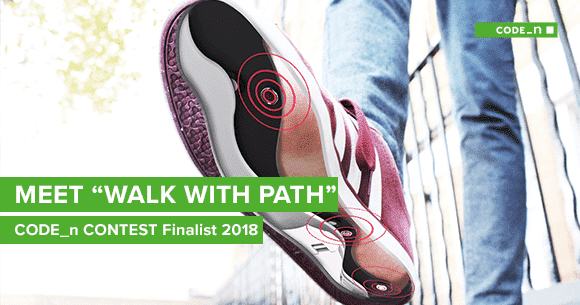MEET OUR CODE_n CONTEST FINALISTS 2018: Walk With Path from the United Kingdom
 The definition of HealthTech is creating solutions that transform and save lives and advance treatments for the well-being of millions of people. Our CODE_n CONTEST Finalist Walk With Path is the epitome of an impactful HealthTech. The London-based startup deals with mobility aid technology and seeks to improve the lives of people with motor impairment. With broad expertise in medicine, design, engineering and business, the team developed an innovative tech solution called Path Feel – an insole that uses sensors to measure the pressure applied to the sole, the acceleration and the trajectory of the user’s gait. This way, Path Feel can prevent falls. Read our interview with Florian Puech, the Technical Lead of Walk With Path to find out more.
The definition of HealthTech is creating solutions that transform and save lives and advance treatments for the well-being of millions of people. Our CODE_n CONTEST Finalist Walk With Path is the epitome of an impactful HealthTech. The London-based startup deals with mobility aid technology and seeks to improve the lives of people with motor impairment. With broad expertise in medicine, design, engineering and business, the team developed an innovative tech solution called Path Feel – an insole that uses sensors to measure the pressure applied to the sole, the acceleration and the trajectory of the user’s gait. This way, Path Feel can prevent falls. Read our interview with Florian Puech, the Technical Lead of Walk With Path to find out more.
Iulia: What is Walk With Path all about?
Florian: Walk With Path is a healthtech startup that makes mobility aids for people with neurological disorders. Our aim is to boost walking confidence and independence while reducing the number of falls and helping people feel less worried about falling. Our main target users are people with Parkinson’s disease (PD), multiple sclerosis (MS), or diabetic neuropathy, but also healthier senior citizens. We aim to make mobility aids that are designed with the user in mind. Our solutions have incorporated feedback from patients and healthcare professionals from the start. This has allowed us to make hands-free and intuitive products that users are not ashamed of using – something that is often the case with the canes and walking frames currently in use.
Iulia: How did you come up with the idea?
Florian: Our founder, Lise Pape, came up with the concepts of Path Finder and Path Feel in 2014 while studying Innovation Design Engineering at the Royal College of Art and Imperial College London. Lise has personal experience with Parkinson’s and has seen how it can increase the risk of falls and affect the quality of life. This led her to explore the problems people face with Parkinson’s and multiple sclerosis (MS) and the impact these conditions have on daily life. The result of her work was a design for Path Finder. It was developed for people with Parkinson’s disease, who sometimes suffer a symptom called “freezing.” This feels like your feet are glued to the floor. She also developed Path Feel, an insole that improves balance.
Iulia: What issues are you trying to solve?
Florian: Path Feel aims to prevent falls among people with physical balance issues due to sensory deficits. Balance problems are often caused by conditions such as diabetes, multiple sclerosis, Parkinson’s disease, or simply growing old. In the UK alone, six people fall every minute and one in three people over the age of 65 fall at least once a year. Falls are now the leading cause of trauma-related fatalities among the elderly and have a significant impact on psychological and physical wellbeing. Not only does this affect the quality of life, but it also restricts independence, which can lead to depression and other conditions caused by a sedentary lifestyle. Falls create significant costs for healthcare providers, including the UK National Health System, which spends £2.3 billion on falls every year. With changing demographics, these costs are expected to rise, so it is essential to find preventative solutions.
Iulia: What feedback have you received so far from Path Feel users?
Florian: Path Feel is scheduled to be launched in early 2019, and user feedback from trials has been good. Throughout development, we have been carrying out public patient involvement (PPI) studies with potential users to assess how people feel about existing mobility products and validate the needs of users. This ongoing user research lets us assess the impact Path Feel has on balance and whether it increases walking confidence. Until now we have only received positive feedback. Users like the fact that the device is hands-free and they have reported feeling more confident when walking, less afraid of falling, and more confident when bending down. The PPI studies were carried out in collaboration with the AARP, which asked family members and the caregivers of fall sufferers what they thought of the idea. 81% of respondents were interested in Path Feel, highlighting how much of a problem falls and the fear of falls are to users and their families. Neurologists are also excited about the data capabilities of the new device since more data can be gathered on patients in their homes, especially compared to just drawing on patient feedback.
Iulia: Thanks so much for the interview, Florian, and all the best to you and your team!
Meet Walk With Path at the new.New Festival 2018 this fall, in Stuttgart!






Write a comment